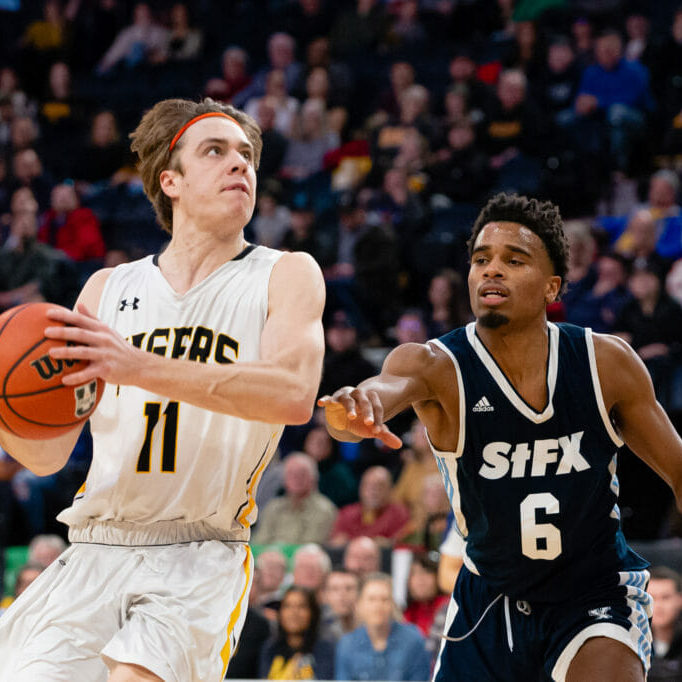
Second shot for seniors
Unfinished business and leadership opportunities among incentives for student-athletes using final years of eligibility after a COVID-19-ruined season
In 2020, U SPORTS said senior-aged student-athletes could retain their final year of eligibility due to the cancelled season. Many Dalhousie University Tigers athletes chose to stay in school through the 2021-2022 season to redeem it.
That list of players includes men’s basketball leading scorer, Keevan Veinot. He chose to delay his graduation for the opportunity to play his last season.
Coming off of a loss against the Carleton University Ravens in the U Sports Final 8 men’s basketball championship final, Veinot did not want to end his tenure with the team in a COVID-19-ruined season. Helping his team to 19 wins and only one loss during the 2019-2020 Atlantic University Sport (AUS) regular season, anyone could see why Veinot would want one last chance with the Tigers.
“I would have graduated with only three years of eligibility instead of four, and I always wanted to do four,” Veinot said. “The fact that we couldn’t have a season last year, I wanted to come back to fulfill the duties that we as a team think that we can do, like win a championship.”
U SPORTS’ decision
U SPORTS repeated through 2020-2021 it would not charge a year of eligibility against student-athletes without an actual season. Its rule of thumb was whether it could offer a national championship in a sport. Without a national championship, players could retain a year of eligibility. Few exceptions get in the way of that, like U SPORTS football’s age cap.
Riley Donovan, a striker for Dal’s women’s soccer team, always had her eyes locked on an extra season. Donovan tore her ACL in May 2017 in a club practice a couple of weeks after joining the Tigers. Since that forced her to miss the entire 2017 campaign, she kept a year of eligibility. Only two of her years have been used up, in the 2018 and 2019 seasons.
Due to the cancelled season last year, many players have not been in an official game. This puts experienced players like Donovan to the test.
“We have a lot of younger players coming in,” she said. After not using a year of eligibility last year due to COVID-19, Donovan will complete her fifth year of university and still have another year of eligibility. “It will be good to have the existing fourth-year players, and me as well, out there on the field because we’ve played in AUS seasons before and the rookies we had last year, they didn’t actually get to play in a season.”
For Donovan to recover from the ACL tear and finish 16th in the AUS in goals in 2019 took determination. Perhaps that determination can trickle down to her teammates, as Donovan will captain her team this year.
“It’s kind of like we’ll be having two years of new players out there who haven’t actually played in a real AUS game,” she said. “With that being said, having the fourth-years and myself as a fifth-year out there will be crucial to keep everyone calm and to make sure we win games.”
Leading the way
The experience athletes possess in their final years of eligibility holds value. Having an experienced player brings leadership. That’s a crucial factor considering influxes of young athletes need time to transition to the university level each year.
Alex Carson, a guard on the Dalhousie men’s basketball team who led the AUS in three-point shots made per game in 2019-2020, said he is ready to take on a larger leadership role in his last year of eligibility.
“With all the younger guys, [someone must] show them the work ethic it takes to get to nationals and get a medal on the court and off the court, putting in work in the classroom, helping them with finding tutors,” Carson said. “Also, it’s how to cope with basketball and university, because it’s a whole new thing for these high school students coming in. It’s pretty eye-opening. It’s good to be that calming veteran voice for the young guys. That’s what I had. I want to be that for our young guys.”
Veinot has a work ethic that can rub off on the youngsters. Increasing his points-per-game average from 8.2 in his first season to 15.6 in 2019-2020 is proof of just that.
“Now being 22 and playing basketball at a higher level, coming back to 18-year-olds with us for the first time,” he said, “with the maturity I think I’ve developed since being in first-year, I can sort of show them the ropes and teach them what’s going on.”






